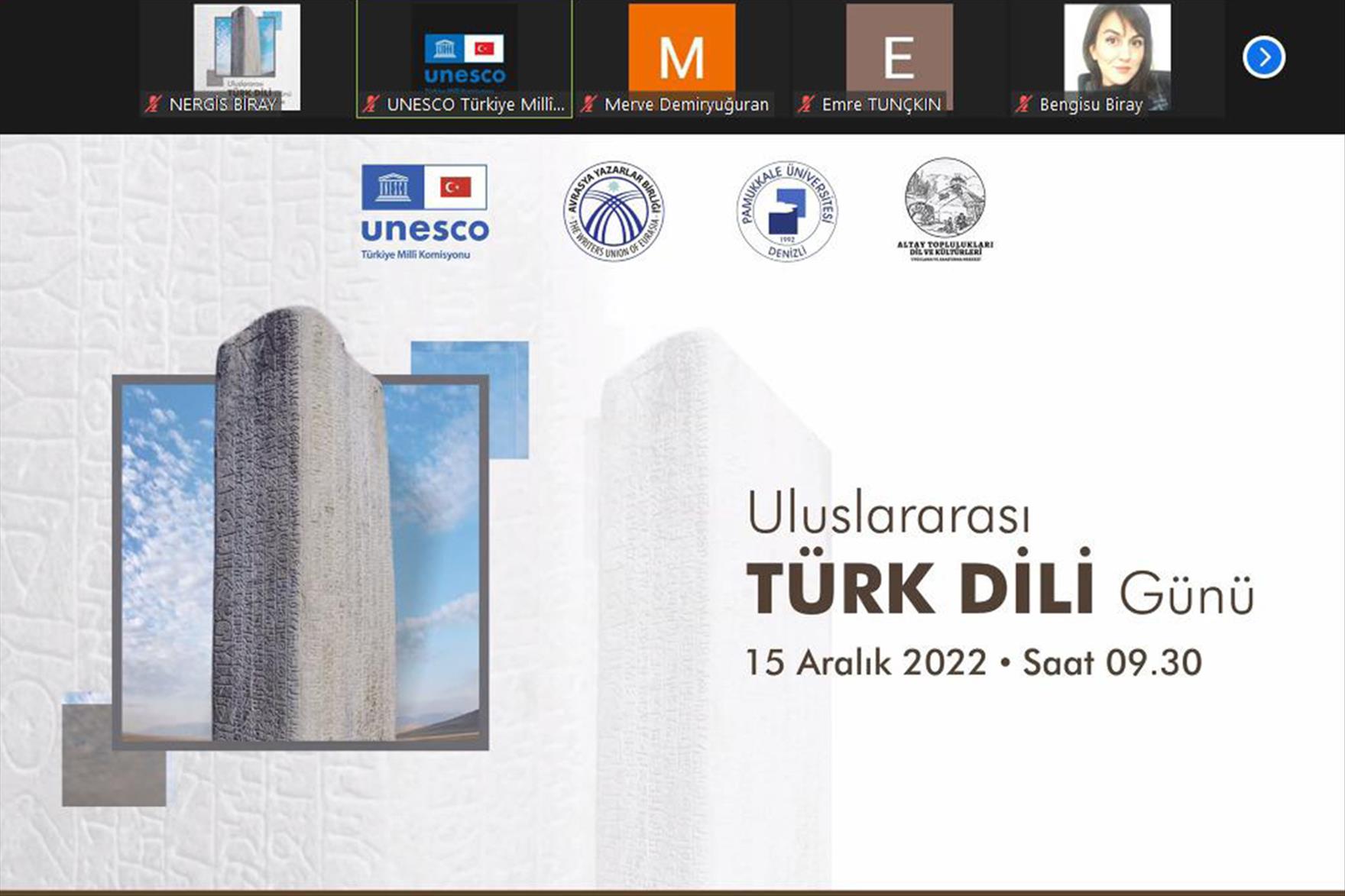II. International Day of the Turkic Language Celebrated
The second International Turkic Language Day celebration was held with the cooperation of Pamukkale University Altai Communities Language and Cultures Application and Research Center (ALTAY DİLMER) and Eurasian Writers Union with the support of UNESCO Turkish National Commission.

Following the process carried out by the UNESCO National Commissions of Turkey, Azerbaijan, Turkmenistan, Uzbekistan, Kazakhstan and Kyrgyzstan, the celebration of December 15, the date when Vilhelm Thomsen announced that he had deciphered the Orkhon Inscriptions, as the International Day of the Turkic Language was consultatively adopted last year on June 4, 2021, with the participation of all stakeholders. After June 4, 2021, Pamukkale University Altai Communities Language and Cultures Application and Research Center and Eurasian Writers' Union joined hands and proposed that this meaningful day be announced to the public with a preliminary program with a panel and opening speeches before the acceptance of this day by UNESCO with the contribution of these institutions in the process of preparing an international day to UNESCO. The Turkish National Commission for UNESCO found this proposal appropriate and thus contributed to the organization of this meeting. This year, ALTAY DİLMER and the Eurasian Writers' Union applied to the UNESCO National Commission of Turkey to hold the same meeting again and to make it traditional, and the second meeting was held as an online meeting.
"Turkish Civilization and Global Culture: Ilterish Kutluk Khan Bitik Stone"
On the same day and time as the program at PAU, an international forum titled "Turkish Civilization and Global Culture: Ilterish Kutluk Khan Bitik Stone" was also organized at the UNESCO Headquarters. Many institutions and organizations such as the Organization of Turkic States, the International Turkic Academy, the Turkish National Commission of UNESCO, national commissions of other Turkic states, national academies of the Turkic world participated in this forum. In addition, scientists presented information about the scientific and archaeological discoveries of their excavations in the Arkhangay region of Mongolia and the stones inscribed in the Turkic language.
The program hosted by PAU was attended by Pamukkale University Rector Prof. Dr. Ahmet Kutluhan from Turkey, Assist. Prof. Dr. Sema Eynel on behalf of PAU ALTAY Language Center Directorate, Prof. Dr. Prof. Nergis Biray as a member of the Scientific Board of the Turkish Language Association, President of the Eurasian Writers Union Assoc. Prof. Dr. Yakup Ömeroğlu, Prof. Dr. Ahmet Buran, Prof. Dr. M. Fatih Kirişçioğlu, Assoc. Prof. Dr. Elçin İbrahim from Azerbaijan, Assoc. Prof. Dr. Berdi Sarıyev and Assoc. Prof. Dr. Gülalek Nurmuhammedova from Turkmenistan, Dr. Bahrom Irzayev from Uzbekistan, Prof. Dr. Kayırbek Kemenger from Kazakhstan, Assoc. Prof. Dr. Mirzat Rakımbek Uulu, Prof. Dr. Ercan Alkaya, Writer Osman Çeviksoy.
UNESCO National Commission of Turkey continues its efforts with the support of all institutions of the Turkic world by maturing its work on the Turkic Language in accordance with the relevant decisions of the United Nations. The National Commission of UNESCO Turkey, the National Commissions of Azerbaijan, Kazakhstan, Kyrgyzstan, Turkmenistan and Uzbekistan came together to carry out this process and decided together. In last year's program, Prof. Dr. Öcal Oğuz, President of the UNESCO NTC, stated that such an agreement was reached with stakeholder institutions and public institutions for the date of December 15, and within this framework, the date when Thomsen declared that the Göktürk Inscriptions were in Turkish was being worked on and preparations were underway to be presented at the UNESCO general conference to be held in 2023 as "International Turkic Language Day".
As Pamukkale University, we share the view that the visibility of our language, which is spoken with its various dialects, accents and subdialects in a very wide geography of nearly 300 million people, will increase with these studies on the axis of the idea of protecting languages announced at the UNESCO general conference. In order for our language to live forever, it is inevitable that goals such as increasing its international visibility should be seen as a common ideal by all our institutions. Every effort to make our language more visible is supported by us as an institution.
